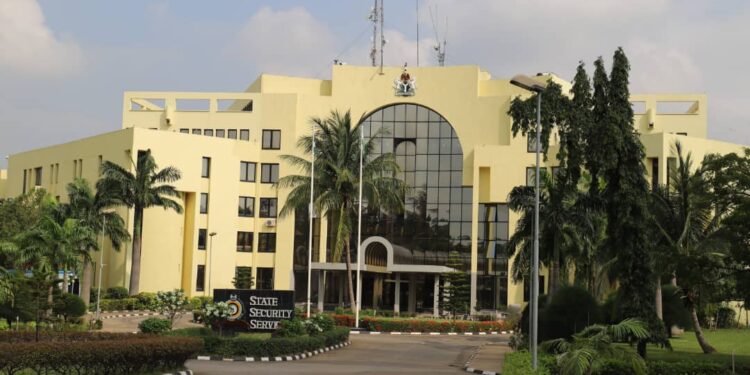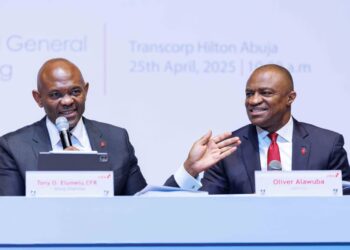Nigeria’s Department of State Services (DSS) has disclosed how several staff members of the Central Bank of Nigeria (CBN) allegedly aided in the theft of public funds through the federal government’s Anchor Borrower Programme (ABP) established under former President Muhammadu Buhari.
The DSS’s allegations, presented in a counter-affidavit exclusively seen by Nairametrics, responded to a lawsuit filed by Ansar Technology Nigeria Ltd and its management—one of the anchors for participation in the agricultural programme.
Ansar had sued the DSS and the Director of the Directorate of Proceeds of Crime Recovery & Management (DPCRM), State Security Service, in an originating summons marked FHC/ABJ/CS/1274/2023, insisting that the security agency lacks the power or privilege to subject the plaintiffs to investigation or prosecution for any act or omission that does not violate or endanger Nigeria’s internal security.
The plaintiffs emphasized before the court that the DSS allegedly does not have the statutory power to recover the debt arising from the time loan facility granted to them by Keystone Bank Ltd under the CBN’s Anchor Borrowers Programme in 2021.
Claims of the Plaintiffs
The plaintiffs’ counsel, Godwin Chigbu Esq, urged the court to declare that the Anchor Borrowers Programme executed by the CBN under President Muhammadu Buhari’s administration and the company’s participation in the programme do not constitute a criminal offense under Nigerian law, thereby warranting the DSS’s investigation, arrest, detention, or prosecution.
- Aminu Haruna, Administrative Officer of Ansar, explained in an affidavit dated September 15, 2023, that in 2020, after following all required procedures, his company was qualified by the CBN for a credit facility under the CBN’s Anchor Borrowers Programme to enable it to cultivate 20,000 hectares of rice farmland.
- He stated that Keystone Bank Ltd was one of the banks participating in the Anchor Borrowers Programme as a Participating Financial Institution (PFI), whose functions included verifying the capacity and suitability of the anchor (in this case, the first plaintiff) to participate in the programme.
- He added that the bank recommended the anchor for participation in the programme, including granting loan facilities while supervising the project from inception to completion.
- He stated that his company secured 10,000 hectares of farmland in Gunmi and Bukkuyum communities in Zamfara State and 10,000 hectares in Jigawa State for the project, with relevant stakeholders visiting these locations at various times for inspections from inception until the events that imperiled the project occurred.
- He noted that after assessing the company’s preparedness and suitability for the project, Keystone Bank Ltd approved a loan facility of N4,807,500,000 under the CBN’s Anchor Borrowers Programme as a time loan to the company for project execution.
“Out of the loan amount of N4,807,500,000, the first plaintiff was only able to access a portion for the execution of the project,” he stated, adding that before the rice matured for harvest in the Zamfara State farm around April and May 2021, insecurity, kidnapping, and banditry intensified in the area, making it unsafe for the company and its workers to continue farming activities.
“Thus, the investment in the Zamfara farmlands became a total loss,” he explained, noting that relevant stakeholders, including staff of Keystone Bank Ltd, were allegedly aware of the situation.
He claimed that Keystone Bank Ltd had provided Veritas Kapital Assurance Plc as the insurer of the company’s farms under the programme, and Ansar paid the insurance premium as demanded by Keystone Bank Ltd and Veritas, thereby entering into an insurance contract.
“When the farms were imperiled as described above, the plaintiffs contended that Veritas should fulfill its obligations under the insurance contract; or alternatively, Keystone Bank Ltd and Veritas Kapital Assurance Plc should be responsible for repaying the loan since the primary source for repayment had failed due to reasons that fall within the insured events.
“Keystone Bank Ltd and Veritas resisted the plaintiffs’ contention, leading to disputes over who should be responsible for repaying the loan,” he submitted, adding that the plaintiffs, Keystone Bank Ltd, and Veritas could not amicably resolve the issue of liability for loan repayment, prompting them to institute a suit at the FCT High Court to determine who should repay the loan.
He stated that despite the pending suit, to the knowledge of the DSS, its officials have continued their debt recovery efforts against the plaintiffs, prejudicing the said suit.
He urged the court to hold that the issue of non-repayment of the loan is purely a civil matter and does not have a criminal aspect.
What the DSS is Saying
Eno Uso-Essien, female personnel of the State Security Service (SSS) attached to the Directorate of Proceeds of Crime Recovery and Management, National Headquarters, Abuja, deposed in a sworn affidavit that the defendant’s mandate includes detecting, preventing, and investigating economic crimes of national security dimension, as well as any activities that could sabotage the country’s economic development.
- The official stated that a Joint Committee was also constituted, comprising the Economic and Financial Crimes Commission (EFCC), Nigerian Financial Intelligence Unit (NFIU), Code of Conduct Bureau (CCB), Federal Ministry of Justice (FMoJ), and the Independent Corrupt Practices and Other Related Offences Commission (ICPC) for this purpose.
- She submitted that upon the commencement of the investigation by the Committee, the Central Bank, Participating Financial Institutions (PFIs), and beneficiaries were indicted in the preliminary investigation.
- According to the official, some of the indictments included overriding the laid-down guidelines to favor particular beneficiaries, deliberate delays in disbursing funds by PFIs, and beneficiaries collecting money from farmers out of season and in areas unsafe for cultivation due to insecurity.
- She noted that all beneficiaries indicted in the preliminary investigations were invited through their PFIs to enable the committee to ascertain the veracity of the allegations against them.
- She said the plaintiffs were indicted for overriding the guidelines and accessing funds for farmers in Gunmi and Bukkyum communities in Zamfara State, areas not easily accessible due to insecurity, and for preparing documents for their defense.
Explaining the role of the CBN, the deponent stated that the CBN and PFIs were also indicted “for insisting that beneficiaries insure their farms with particular insurance companies that lacked capacity, and for which a very meager amount was paid as a premium.”
“Ansar is suspected to be one of the conduits for the pilfering of public funds through the Anchor Borrower Programme (ABP) by staff of the Central Bank of Nigeria (CBN),” the DSS stated in its affidavit seen by Nairametrics.
The DSS added that the plaintiffs were aware of the challenges posed by sustained insecurity and flooding in Zamfara and Jigawa, where they intended to farm, but deliberately collaborated with officials of the Anchor Borrower Programme, including CBN staff, to override the guidelines and access the time loan with no intention of repaying it.
The DSS accused the plaintiffs of instituting the suit solely to prevent the Committee from discharging its statutory mandate, attempting to use the court to hinder the DSS’s ongoing national financial crime investigation.
“The investigation has assumed a wider dimension, and other collaborators identified during the investigation will be prosecuted. The activities of the plaintiffs constitute a potent threat to national security and economic policy, affecting the President of Nigeria’s renewed hope agenda in the area of food security.
“It would not be in the interest of justice and national security to grant the defendants’ relief,” the official responded.
Nairametrics gathered that the case came before Justice Inyang Ekwo on October 2, 2024, and was adjourned to November 20, 2024, for further hearing.
Nairametrics reached out to a source at CBN for a reaction.
However, obtaining his views was unsuccessful, as he maintained that the matter is still pending in court.
Backstory
The Anchor Borrowers Programme (ABP) of the CBN was established in November 2015 with the objective of creating economic linkages between smallholder farmers (SHF) and anchors.
The current suit follows a presidential directive to the DSS to investigate economic crimes of the national security dimension carried out through the Central Bank of Nigeria.
- The mandate of the Joint Committee includes investigating the sharp practices identified in the execution of the Anchor Borrower Programme (ABP) among other issues by the Central Bank of Nigeria (CBN) through the Participating Financial Institutions (PFIs).
- Nairametrics previously reported that the House of Representatives initiated an investigation into the N1.12 trillion Anchor Borrowers Scheme, a federal government initiative for agricultural funding through the CBN.
- The probe was mandated to include the Nigeria Incentive-Based Risk Sharing System for Agricultural Lending (NIRSAL), the Bank of Industry (BoI), and other agencies.
- This decision followed the adoption of a motion by Rep. Chike Okafor (APC-Imo) in Abuja on Tuesday. Okafor attributed the increasing food scarcity and malnutrition in Nigeria to the alleged mismanagement of agricultural funds intended for development.
On April 8, 2024, the CBN dismissed five to eight directors. Those affected were from the Trade and Exchange Department, Securities Department, Development Finance Department, Purchasing and Support Services Department, and Public Affairs Department, Nairametrics previously reported.
The apex bank had dismissed over 110 staff members across its 27 departments, according to multiple sources.
- CBN insiders previously told Nairametrics that the dismissed staff members were those who played active roles in management under former CBN Governor Godwin Emefiele.
- In particular, the Development Finance Department has been heavily affected by the dismissals. Insiders said those retrenched directly or indirectly managed development funds such as the Anchor Borrowers Scheme (ABP), Real Sector Support Facility (RSSF), Micro, Small and Medium Enterprises Development Fund (MSMEDF), and the Agricultural Credit Guarantee Scheme.
- Insiders informed Nairametrics that Cardoso is upset with how staff members have betrayed the central bank in the management of the ABP.





















